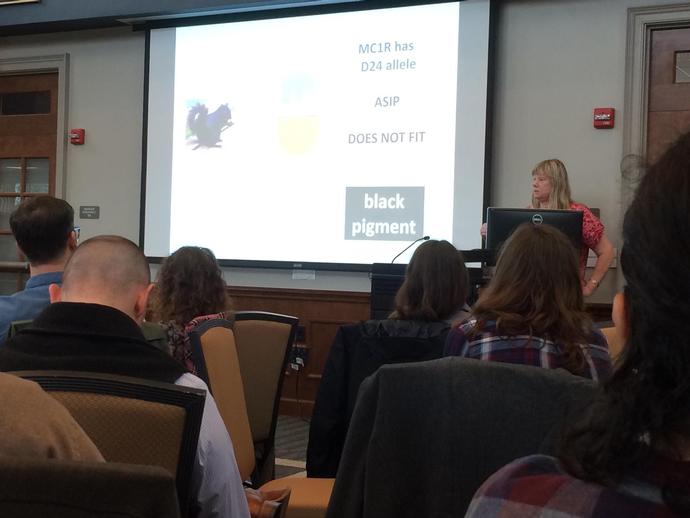February 10, 2020
Dr. Nancy Moncrief, curator of mammalogy, and Liberty Hightower, research technician, participated in the 2020 Annual Meeting of the Virginia Chapter of The Wildlife Society last week at Randolph-Macon College in Ashland. The meeting provided an opportunity for members to gather and discuss ongoing projects, wildlife issues, and network.
Dr. Moncrief conducted a 15 minute professional presentation titled "Genetics of melanism in Eastern gray squirrels and Eastern fox squirrels". During the presentation, Dr. Moncrief discussed her work examining melanism (fur that is all black) in gray squirrels and fox squirrels. Dr. Moncrief recently co-wrote a scientific paper examining the link between genetics and coat color in these two species of squirrels, and Moncrief and her colleagues discovered evidence that the two species had hybridized in the distant past. This is the first time such evidence has been found, and the findings buck the conventional wisdom that mammals rarely hybridize.
Dr. Moncrief also presented the poster "Recent Records and Range Expansion of North American Porcupine in Virginia". Although North American porcupines occurred in Virginia prehistorically and into the 1700's, this species was probably extirpated from the state by the mid-1800's. Researchers documented recent evidence of porcupines in Virginia from verified photographs submitted to the Virginia Department of Game and Inland Fisheries and voucher specimens deposited into the mammal collection of the Virginia Museum of Natural History. These recently collected and observed porcupines are likely dispersers from expanding populations in western Maryland and eastern West Virginia. This report includes definitive evidence of reproduction in Virginia populations and provides a foundation for future investigations into the distribution and abundance of porcupines in Virginia.
Liberty Hightower presented the poster "First records of the Neotropical deer ked Lipoptena mazamae Róndani (Diptera: Hippoboscidae) from Virginia". In short, Hightower discussed the deer ked Lipoptena mazamae, which was very recently recorded in Virginia for the first time. A deer ked is a blood-sucking parasite that resembles a tick, but it is actually a type of fly. Upon finding a suitable host – in this case, a deer – the fly tears its wings off and it spends the rest of its life on the host.

 Hours & Admissions
Hours & Admissions Directions
Directions

